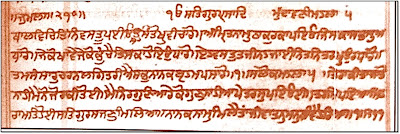The town of Bakala (later renamed ‘Baba Bakala’) was very famous for its water wells and rest houses for passing travellers. It was a place of serenity and happiness. Whilst living in the town of Bakala, (Guru) Teg Bahadur jee had a routine of waking up Amrit Veyla (last part of the night before sunrise) and immersing Himself in singing Keertan (praises of the Almighty), and then during the day working for a living (Kirat Kamaayee). Other Sikhs gave special respect to (Guru) Teg Bahadur jee as he was the son of Sixth Guru, and give him offerings of money and other gifts. However, (Guru) Teg Bahadur jee would instead shared all that was offered to him with others.
Whenever someone would ask (Guru) Teg Bahadur jee to give them a religious message/instruction (as a form of blessing), they would reply:
ਘਾਲਿ ਖਾਇ ਕਿਛੁ ਹਥਹੁ ਦੇਇ ॥
ਨਾਨਕ ਰਾਹੁ ਪਛਾਣਹਿ ਸੇਇ ॥੧॥
"One who works for what they eat, and gives and shares some of what they have (with the needy) - (Guru) Nanak (Ji says-) they know the Path (of true living). ||1||"
(Saarang M:1, Ang 1245)
Once, someone asked (Guru) Teg Bahadur jee, “Why do the Bhagats (devotees) of Vaheguru get Dukh (pain and suffering)?” They replied, “How can understand the true reality of the world and life without going through Dukh (pain and suffering)? The Dukh (pain and suffering) we receive actually gives us the understanding and wisdom of reality. For this reason, Bhagats (the devotees of Vaheguru) remain happy even when receiving Dukh (pain and suffering).”
Another time, someone asked (Guru) Teg Bahadur jee, “What are the different stages of Bhagtee (devotional worship of Vaheguru)?” (Guru) Teg Bahadur jee replied, “The first is, stopping all thoughts that takes one away from thinking of Vaheguru. The second is, one has so much love for Vaheguru that they forget everything else. The last is, standing and sitting, consciously and unconsciously, one remains absorbed in the Divine Presence and Light of Vaheguru.” When someone asked them about what Seva (selfless service) of Vaheguru means. They replied, “When ego is destroyed within oneself, and without ego one does work for the Almighty, that is called Seva (selfless service).”

According to the history narrated in the historical manuscripts of
‘Bansawali-Nama’ and ‘Bhatt Vehee’, before receiving Guruship, (Guru)
Teg Bahadur jee went on travels outside of Punjab to spread the message
of Guru Nanak Ji’s teachings for 4 years. In particular he travelled
West and South. Returning back from his preaching tour he
visited Delhi, where he met the Eighth Guru, Guru Har Krishan Sahib jee
at Bangla Sahib on 21st March 1664. From there he quickly returned to
Punjab to the town of Bakala. It seems as if Guru Har Krishan Sahib jee
had instructed (Guru) Teg Bahadur jee to do so.
Source: Principal Satbir Singh's book, 'Et Jin Karee: Jeevani Sri Guru Teg Bahadur Jee' (pages 32-35)




















































